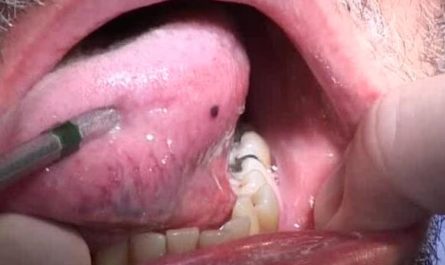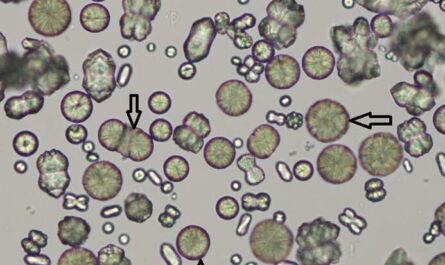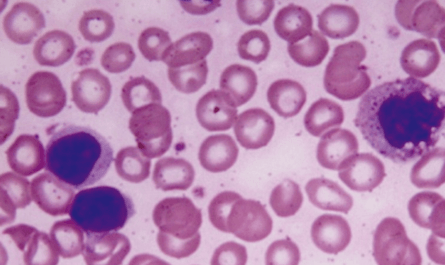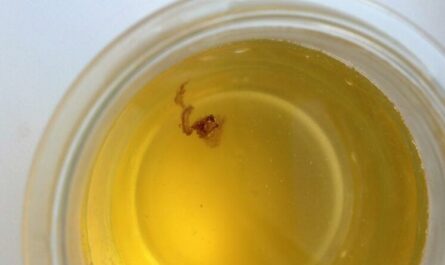Intestinal parasites are a common health concern that can cause many uncomfortable symptoms. These tiny organisms can invade our bodies through contaminated food or water, and once inside, they can wreak havoc on our digestive system.
From bloating and diarrhea to fatigue and nausea, the symptoms of intestinal parasites can be difficult to ignore. But don’t worry; plenty of treatments are available to help you get rid of these unwanted guests. In this article, we’ll look at 10 signs you carry intestinal parasites and how to treat them.

Types of intestinal parasites
Many types of parasites can live freely inside the body. They come in different shapes and sizes.
1. Giardia
Giardia is a single–celled parasite found in the intestines of humans and animals. It is one of the most common intestinal parasites, mainly spread through contaminated food and water.
Symptoms can include abdominal pain, bloating, diarrhea, and nausea. Treatment is typical with antibiotics or antiparasitic medications.
2. Hookworms
Hookworms are parasites that attach to the walls of the small intestine and feed off the blood of their host. They can be contracted through contact with contaminated soil or feces. Symptoms can include anemia, abdominal pain, and diarrhea. Treatment is typical with anthelmintic medications.
3. Roundworms
Roundworms are parasites found in the intestines of humans and animals. They can be contracted through contact with contaminated soil or feces.
Symptoms can include abdominal pain, nausea, vomiting, and diarrhea. Treatment is typically with anthelmintic medications.
4. Pinworms
Pinworms are thin, white parasites that can be found in the intestines. They are highly contagious and can be spread through contact with contaminated surfaces or objects. Symptoms can include itching around the anus, loss of appetite, and insomnia. Treatment is typical with anthelmintic medications.
5. Tapeworms
Tapeworms are long, flat parasites found in the intestines of humans and animals. They can be contracted through contact with contaminated food or water. Symptoms can include abdominal pain, nausea, and diarrhea. Treatment is typical with anthelmintic medications.
10 Signs That You Are Carrying Intestinal Parasites
1. Persistent Digestive Issues
If you’re experiencing persistent digestive issues such as diarrhea, constipation, bloating, or abdominal pain, it could be a sign of a parasitic infection.
Parasites can disrupt the normal functioning of the digestive system and cause these uncomfortable symptoms. If you notice a sudden change in your bowel habits that lasts for an extended period, it’s essential to consult a healthcare professional.
2. Unexplained Weight Loss
Sudden and unexplained weight loss can cause concern, especially when accompanied by other symptoms. Certain parasites feed on the nutrients in your body, causing a decrease in appetite and weight loss.
If you’ve noticed a significant drop in weight without making any changes to your diet or exercise routine, it’s advisable to get checked for parasites.
3. Chronic Fatigue
It could be a sign of a parasitic infection if you’re constantly tired, even after getting enough rest. Some parasites can cause anemia or release toxins that drain your energy levels.
If you struggle to stay awake or lack the energy to perform daily activities, it’s essential to consider the possibility of a parasitic infection.
4. Skin Issues and Allergies
Parasites can have a direct impact on your skin health. Skin rashes, hives, eczema, or other unexplained skin issues can signify a parasitic infection.
Additionally, parasites can trigger allergic reactions in some individuals, leading to symptoms such as itching, redness, or swelling. If you’re experiencing persistent skin problems or unusual allergic reactions, it’s advisable to consult a dermatologist.
5. Muscle and Joint Pain
Parasitic infections can also manifest as muscle and joint pain. These parasites can invade your muscles and joints, leading to inflammation and discomfort.
If you’re experiencing unexplained muscle aches, stiffness, or joint pain, it’s essential to get evaluated by a healthcare professional to rule out any underlying parasitic infection.
6. Mental Health Issues
While the connection may not be immediately apparent, parasitic infections can affect mental health. Some parasites release toxins that affect the central nervous system, leading to symptoms such as anxiety, depression, irritability, or even cognitive difficulties.
If you’re experiencing persistent mental health issues without apparent cause, it’s crucial to consider the possibility of a parasitic infection.
7. Disturbed Sleep Patterns
Parasites can disrupt your sleep patterns and lead to insomnia or restless sleep. It could be a sign of a parasitic infection if you have trouble falling asleep or experiencing restless and disturbed sleep. Addressing the underlying cause is essential for restoring healthy sleep patterns.
8. Iron Deficiency Anemia
Iron deficiency anemia occurs when your body lacks enough iron to produce sufficient red blood cells. Certain parasites can feed on your blood, leading to iron deficiency anemia.
Symptoms of anemia include fatigue, weakness, pale skin, and shortness of breath. If you’re experiencing these symptoms, it’s essential to get a blood test to check your iron levels and rule out any underlying parasitic infection.
9. Dental Problems
Parasitic infections can also affect your oral health. Some parasites can cause dental problems such as tooth decay, gum disease, or persistent bad breath.
If you’re experiencing unexplained dental issues despite maintaining good oral hygiene, it’s advisable to consult a dentist to rule out any parasitic infection.
10. Food Cravings and Nutritional Deficiencies
Parasites can interfere with your body’s absorption of nutrients, leading to nutritional deficiencies. In response, you may experience intense food cravings, especially for sugary or starchy foods.
These cravings can result from the parasites’ need for certain nutrients. If you find yourself constantly craving specific foods or experiencing nutritional deficiencies, it’s essential to consider the possibility of a parasitic infection.
How to Get Rid of Intestinal Parasites with Home Remedies
1. Garlic
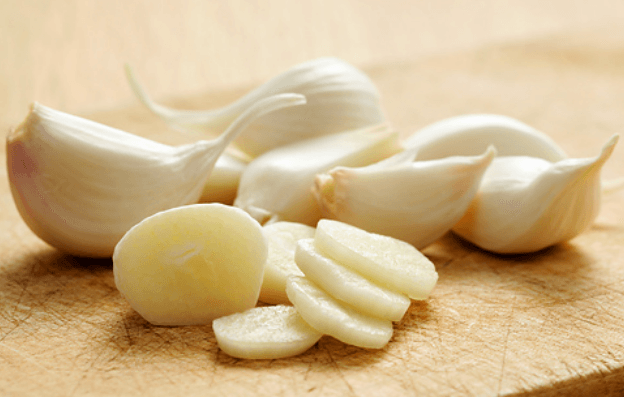
Garlic is one of the most popular anti-parasitic foods that can help manage different types of intestinal worms. Raw garlic contains sulfur with amino acids, which are anti-parasitic.
Garlic also contains antibacterial, antiseptic, and antifungal properties, which can assist in eliminating the microbes inside the body.
- To eliminate all parasites in the intestine, consume 3 cloves of raw garlic on an empty stomach. Do this every day for a week to achieve the best results.
- Another way is to boil 2 crushed garlic cloves in 1/2 cup milk. Drink this on an empty stomach every day for 1 week.
2. Coconut
Coconut is considered very effective in eliminating all types of intestinal worms. It contains strong anti-parasitic properties, which can aid in parasite cleansing. Coconut oil is also effective in treating intestinal parasites.
- Eat 1 tbsp of crushed coconut for breakfast. After 3 hours, consume 1 glass of milk mixed with 2 tbsp of castor oil. Do this process every day until the parasites disappear. However, those suffering from gastrointestinal disease and kids below 5 years old are not recommended to take castor oil.
- Extra virgin coconut oil is also effective in treating intestinal parasites. Take 4 to 6 tbs. of coconut oil every day. This oil is rich with medium-chain triglycerides that assist in killing parasites while enhancing the immune system to combat them.
3. Pumpkin Seeds
According to the University of Maryland Medical Center, pumpkin seeds can assist in the elimination of intestinal worms.
Cucurbitacin, a compound in pumpkin seeds, is antiparasitic, which paralyzes the parasites. This prevents them from staying in the intestine linings so they can be flushed away.
- In 3 cups of boiling water, add 2 tbsp of crushed pumpkin seed. Let it sit for 30 minutes, and once it is cool, drink it.
- Another way is to fast for a day. Drink the juice of boiled dry prunes, then drinks the infused pumpkin seed.
- You can also mix 1 tbsp. Of roasted and crushed pumpkin seeds with honey, and eat the mixture while empty. Do this for a week. You can also include bananas and kiwi for your breakfast.
4. Unripe Papaya
Unripe papaya is a common treatment for health problems such as intestinal parasites. This fruit is packed with the enzyme papain. It has anthelmintic properties and can kill intestinal parasites. In addition, papaya seeds also contain ricin which aids in eliminating worms in the intestines.
- Add 1 tbsp. of unripe papaya juice and honey in 3 or 4 tbsp of hot water. Drink the mixture every morning before breakfast. After 2 hours, take a glass of warm milk mixed with castor oil. Do this treatment for three days. If doing this treatment for children, decrease the dosage to half.
- Another way is to make papaya seeds smoothie. Add 1 tbsp. of coconut oil, 1 cup of coconut milk, and papaya fruit. Blend it well and mix 1 tbs. of honey. Drink this smoothie every morning for 1 week until the infestation disappears.
- You can also grind the papaya seeds well to make a powder. Mix the powder with warm water or milk and drink it before breakfast for at least 3 days.
5. Pomegranate Tree Bark
The stems, roots, leaves, and bark of the pomegranate trees are rich in anthelmintic properties, making them an effective treatment for intestinal parasites. The pomegranate tree’s bark has alkaloid punitive, which is toxic to intestinal worms, especially tapeworms.
- Add a 2-inch piece of pomegranate tree bark to 1 cup of water. Boil until half of the water evaporates. After the mixture cools down, drink it. Do this treatment 3 times a day and eat a purgative fruit like avocado or banana to flush the intestinal parasites. Reduce the dosage to 1/3 if using this remedy for children.
6. Carom Seeds
Another effective way of getting rid of intestinal parasites is the carom seed. These seeds contain thymol which can stop the development of intestinal parasites. It is also recommended to use it with jaggery for better effect.
- Eat 1 tbsp. Of jaggery every morning before breakfast. After 15-20 minutes, eat 1/2 tsp. of crushed carom seeds, then drink a glass of water. Do this treatment every day for at least two weeks to eliminate parasites.
7. Carrots
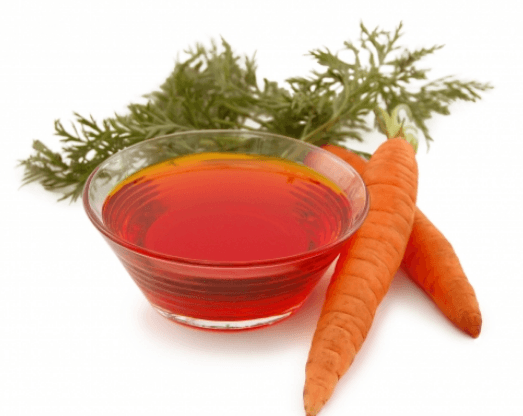
Carrots contain beta-carotene, which can kill the eggs of intestinal worms. In addition, zinc and vitamin C in carrots also enhances the body’s immune system so your body can easily combat the parasites.
- Eat two carrots for breakfast, and make sure to chew them carefully. It is also recommended to grate them so you can chew them better. Do not eat other foods in the morning. Do this treatment daily for a week until the intestinal works are gone.
8. Neem
Neem or Indian lilac is another effective treatment for eliminating intestinal parasites. These contain anti-parasitic properties. Aside from that, these effectively remove the toxins the parasite left behind. Pregnant women or nursing should not eat neem.
- Fry 1 tbsp. of dry neem flowers in 1 tsp. of clarified butter. Eat it with plain rice two times a day. Repeat this treatment for at least days until the parasites disappear.
- Another way is to mix 1 tsp. of dried neem leaf powder with a glass of warm milk and drink it twice daily. Do this treatment for 1 week.
- Alternatively, grind neem leaves and make a paste. Take 1/2 tbsp. of paste and drink a glass of water. Do this treatment every morning on an empty stomach for seven days. Stop for a week, then repeat in the third week.
9. Turmeric
Turmeric is also one of the excellent natural remedies for eliminating parasites in the intestines. They contain antiseptic and antimicrobial properties that aid in purging worms.
In addition, turmeric also aids in alleviating nausea, bloating, and pain in the abdomen, which are the most common symptoms of parasites in the intestines.
- Make a juice out of raw turmeric and a pinch of salt. Drink this turmeric juice every morning before breakfast. Do this treatment every day for a week until the worms are gone. If using turmeric powder, add 1/2 tsp. of turmeric powder in 1/2 cup of warm water. Add a pinch of salt. Drink the mixture every day for 5 consecutive days.
- Another way to purge the parasites is to add 1 tbsp. of turmeric juice to a glass of buttermilk. Drink the mixture. Repeat this treatment for 3 days.
10. Cloves
Cloves contain bactericidal, antiseptic, and antiparasitic properties, which can aid in eliminating parasitic eggs while killing intestinal parasites inside the body. In addition, cloves can also prevent infestations of parasites in the future.
- Add 1 tsp. of powdered clove in one cup of hot water. Cover it and allow it to steep for at least 10 minutes. Drink it 3 times a day for 1 week. Make sure that you use fresh cloves to achieve the best results.
Frequently Asked Questions
1. Can parasites be transmitted from person to person?
Yes, some parasites can be transmitted from person to person. Direct contact with infected individuals, consumption of contaminated food or water, or exposure to infected animals can all lead to the transmission of parasites.
2. Can I prevent parasitic infections?
Yes, there are several measures you can take to prevent parasitic infections. These include practicing good hygiene, washing your hands regularly, properly cooking food, drinking clean water, and avoiding contact with contaminated soil or feces.
3. How are parasitic infections diagnosed?
Parasitic infections are typically diagnosed through a combination of medical history, physical examination, and laboratory tests. Stool tests, blood tests, or imaging studies may be conducted to identify the presence of parasites in the body.
4. Are parasitic infections treatable?
Yes, most parasitic infections are treatable with appropriate medical intervention. The specific treatment will depend on the type of parasite involved. Antiparasitic medications are commonly used to eliminate the infection and alleviate the associated symptoms.
5. Can I get parasites from my pets?
Yes, pets can harbor parasites that can be transmitted to humans. Practicing good hygiene, regularly deworming your pets, and consulting a veterinarian for proper preventive measures is important.
6. How long does it take to recover from a parasitic infection?
The recovery time from a parasitic infection varies depending on the type of parasite, the severity of the infection, and individual factors. Most individuals can recover within a few weeks to a few months with proper medical treatment.

